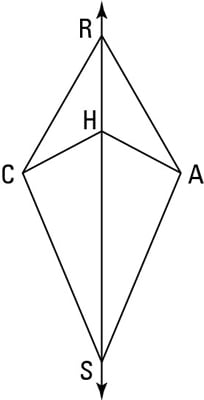Which Quadrilateral Is A Kite
Proving that a quadrilateral is a kite is a piece of cake. Normally, all you accept to do is use congruent triangles or isosceles triangles. Here are the two methods:
-
If two disjoint pairs of consecutive sides of a quadrilateral are congruent, then it's a kite (reverse of the kite definition).
-
If one of the diagonals of a quadrilateral is the perpendicular bisector of the other, then it's a kite (converse of a property).
When you're trying to testify that a quadrilateral is a kite, the following tips may come in handy:
-
Bank check the diagram for coinciding triangles. Don't fail to spot triangles that look congruent and to consider how CPCTC (Corresponding Parts of Congruent Triangles are Coinciding) might help you.
-
Keep the first equidistance theorem in mind (which you might use in addition to or instead of proving triangles congruent): If two points are each (1 at a time) equidistant from the endpoints of a segment, and so those points make up one's mind the perpendicular bisector of the segment. (Here's an piece of cake way to think about it: If y'all have 2 pairs of coinciding segments, then at that place's a perpendicular bisector.)
-
Draw in diagonals. Ane of the methods for proving that a quadrilateral is a kite involves diagonals, and so if the diagram lacks either of the kite's two diagonals, endeavour drawing in one or both of them.
Now become gear up for a proof:


Game plan: Here'southward how your plan of attack might work for this proof.
-
Note that one of the kite's diagonals is missing. Draw in the missing diagonal, segment CA.
-
Check the diagram for congruent triangles. After cartoon in segment CA, at that place are half-dozen pairs of congruent triangles. The two triangles near likely to aid yous are triangles CRH and ARH.
-
Show the triangles congruent. You can use ASA (the Angle-Side-Angle theorem).
-
Use the equidistance theorem.

And so, using the equidistance theorem, those 2 pairs of congruent sides make up one's mind the perpendicular bisector of the diagonal you drew in. Over and out.
Check out the formal proof:
Statement 1 :
![]()
Reason for statement one : 2 points make up one's mind a line.
Statement 2 :
![]()
Reason for argument 2 : Given.
Statement 3 :
![]()
Reason for statement 3 : Definition of bisect.
Argument 4 :
![]()
Reason for statement 4 : Reflexive Holding.
Statement 5 :
![]()
Reason for argument five : Given.
Argument 6 :
![]()
Reason for statement half-dozen : Definition of bifurcate.
Statement vii :
![]()
Reason for statement 7 : If two angles are supplementary to two other congruent angles (angle CHS and angle AHS), then they're congruent.
Statement eight :
![]()
Reason for statement 8 : ASA (3, 4, 7).
Statement 9 :
![]()
Reason for statement nine : CPCTC.
Statement 10 :
![]()
Reason for statement x : CPCTC.
Statement 11 :
![]()
Reason for statement 11 : If ii points (R and H) are each equidistant from the endpoints of a segment (segment CA), then they make up one's mind the perpendicular bisector of that segment.
Statement 12 :
![]()
Reason for argument 12 : If one of the diagonals of a quadrilateral (segment RS) is the perpendicular bisector of the other (segment CA), then the quadrilateral is a kite.
About This Article
This commodity can exist plant in the category:
- Geometry ,
Which Quadrilateral Is A Kite,
Source: https://www.dummies.com/article/academics-the-arts/math/geometry/how-to-prove-that-a-quadrilateral-is-a-kite-188056/
Posted by: whitehavager.blogspot.com


0 Response to "Which Quadrilateral Is A Kite"
Post a Comment